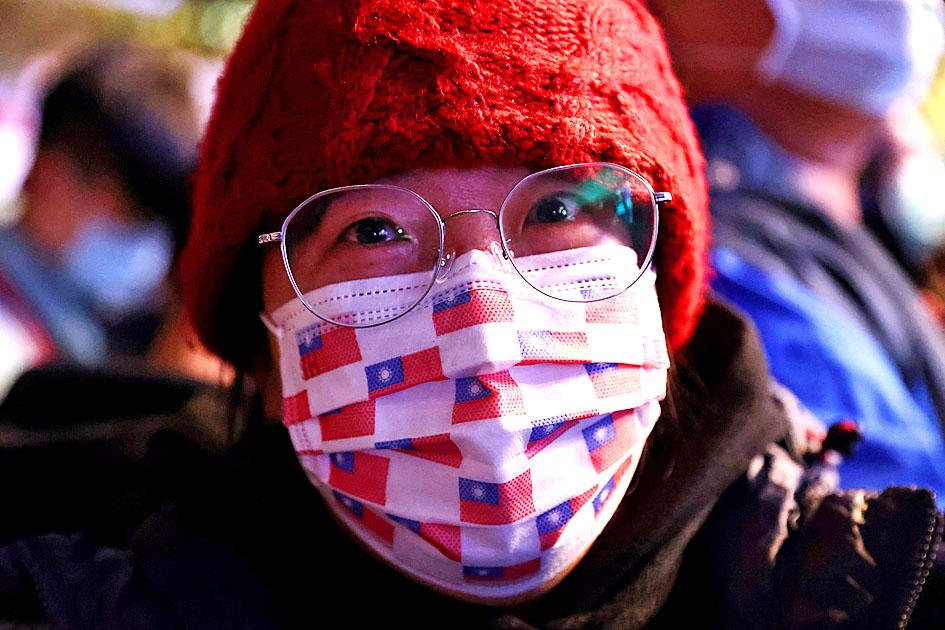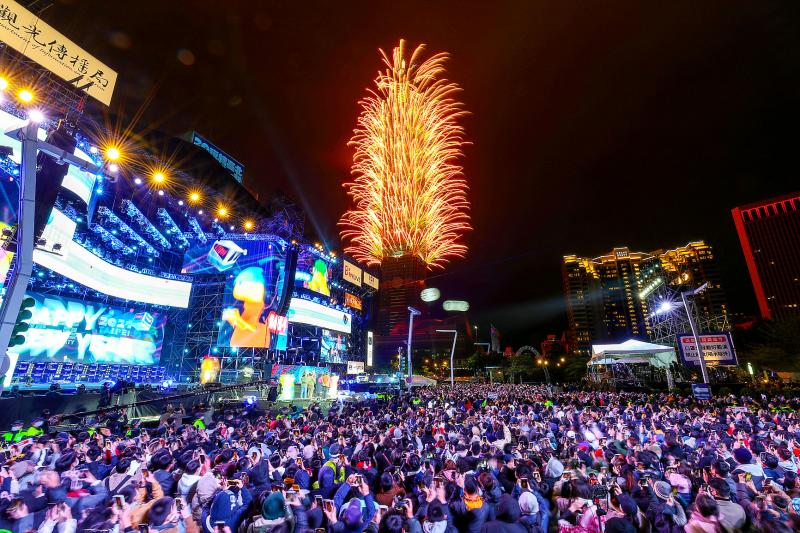Taipei and Taoyuan yesterday reported that individuals who were under orders to self-regulate their viral status attended New Year’s Eve events, although they were all approached and persuaded to leave, with their detection facilitated by a digital system that detects signals from mobile devices.
Taipei Deputy Mayor Vivian Huang (黃珊珊) said that medical personnel at New Year’s Eve events had asked the Central Epidemic Command Center (CECC) to send word to the Taipei City Government should anyone listed as being under self-health management be reported within a 650m radius of city-run events.
The Taipei Police Department sent text messages to such people, informing them that those under self-health management were not allowed to attend, Huang said.

Photo: Ann Wang, Reuters
Those who were still in the area 10 minutes after the message were followed up with a phone call from the city government, she said.
About 30 such people were reported at events on Thursday night and left within 20 minutes of receiving the text message or phone call, Huang said.
The city government is looking into the whereabouts of the people involved, she said, adding that most people had remained in the hotel or residence registered as their location for the period of self-health management.

Photo: RITCHIE B. TONGO, EPA-EFE
The Taipei Tourism Bureau estimated that only 38,000 people attended the city’s New Year’s Eve event, a record low.
In Taoyuan at the Mayday New Year’s Eve concert, CECC standards — including requiring attendees to show identification — helped police extract five people at the event who had been ordered into self-health management, Taoyuan Mayor Cheng Wen-tsan (鄭文燦) said.
The municipality would fine them for breaches of the Communicable Disease Control Act (傳染病防治法), Cheng said.
The five were wearing masks and told officers that they were unfamiliar with pandemic prevention regulations, he said, adding that officers escorted them to their residence or other accommodation.
While the people found to have contravened the law would certainly be fined, the amount has yet to be determined, the Taoyuan Department of Health said.
Centers for Disease Control Deputy Director-General Chuang Jen-hsiang (莊人祥), the CECC’s spokesman, said that the cities’ New Year’s Eve events were the first events at which the CECC had tracked mobile phone numbers via its Digital Fence System 2.0 to identify people ordered into self-health management.
The system monitors the signal from a phone that has a number registered to a person under self-health management, allowing personnel at the events to detect when such people are within a certain distance of the site, Chuang said.
The system only targets people who are under self-health management and does not keep track of everybody, he said.
The third edition of the system, which began development in June, is a handset-based tracking system that allows the CECC to identify and locate individuals under quarantine, isolation or self-health management via triangulation.
When asked why such people were not stopped before they entered the events, Chuang said that the system was being used for the first time on Thursday and the CECC was still calibrating it.
People should follow the law and those who breach the rules face fines of NT$10,000 to NT$150,000, while people who break quarantine rules could be fined NT$60,000 to NT$300,000, he said.

CROSS-STRAIT TENSIONS: MOFA demanded Beijing stop its military intimidation and ‘irrational behavior’ that endanger peace and stability in the Indo-Pacific region The Presidential Office yesterday called on China to stop all “provocative acts,” saying ongoing Chinese military activity in the nearby waters of Taiwan was a “blatant disruption” of the “status quo” of security and stability in the Indo-Pacific region. Defense officials said they have detected Chinese ships since Monday, both off Taiwan and farther out along the first island chain. They described the formations as two walls designed to demonstrate that the waters belong to China. The Ministry of National Defense yesterday said it had detected 53 military aircraft operating around the nation over the past 24 hours, as well

‘LAGGING BEHIND’: The NATO secretary-general called on democratic allies to be ‘clear-eyed’ about Beijing’s military buildup, urging them to boost military spending NATO Secretary-General Mark Rutte mentioning China’s bullying of Taiwan and its ambition to reshape the global order has significance during a time when authoritarian states are continuously increasing their aggression, the Ministry of Foreign Affairs (MOFA) said yesterday. In a speech at the Carnegie Europe think tank in Brussels on Thursday, Rutte said Beijing is bullying Taiwan and would start to “nibble” at Taiwan if Russia benefits from a post-invasion peace deal with Ukraine. He called on democratic allies to boost defense investments and also urged NATO members to increase defense spending in the face of growing military threats from Russia

LEAP FORWARD: The new tanks are ‘decades more advanced than’ the army’s current fleet and would enable it to compete with China’s tanks, a source said A shipment of 38 US-made M1A2T Abrams tanks — part of a military procurement package from the US — arrived at the Port of Taipei early yesterday. The vehicles are the first batch of 108 tanks and other items that then-US president Donald Trump announced for Taiwan in 2019. The Ministry of National Defense at the time allocated NT$40.5 billion (US$1.25 billion) for the purchase. To accommodate the arrival of the tanks, the port suspended the use of all terminals and storage area machinery from 6pm last night until 7am this morning. The tanks are expected to be deployed at the army’s training

TECH CONFERENCE: Input from industry and academic experts can contribute to future policymaking across government agencies, President William Lai said Multifunctional service robots could be the next new area in which Taiwan could play a significant role, given its strengths in chip manufacturing and software design, Taiwan Semiconductor Manufacturing Co (TSMC, 台積電) chairman and chief executive C.C. Wei (魏哲家) said yesterday. “In the past two months, our customers shared a lot of their future plans with me. Artificial intelligence [AI] and AI applications were the most talked about subjects in our conversation,” Wei said in a speech at the National Science and Technology Conference in Taipei. TSMC, the world’s biggest contract chipmaker, counts Nvidia Corp, Advanced Micro Devices Inc, Apple Inc and